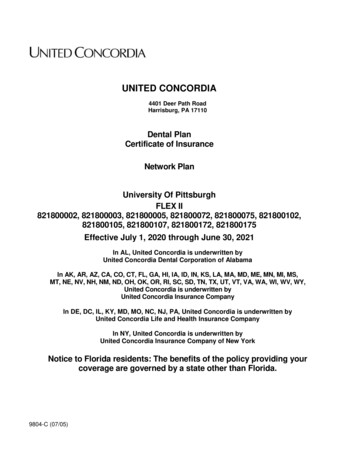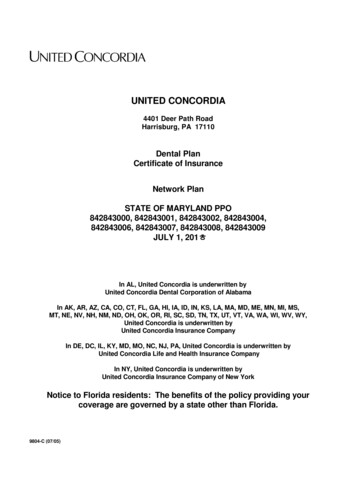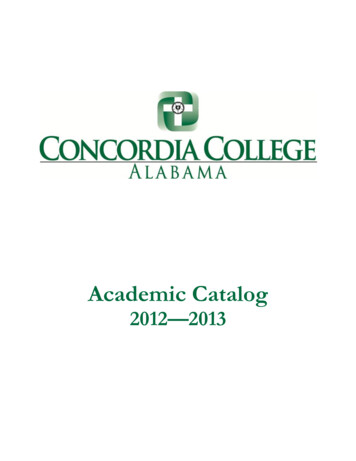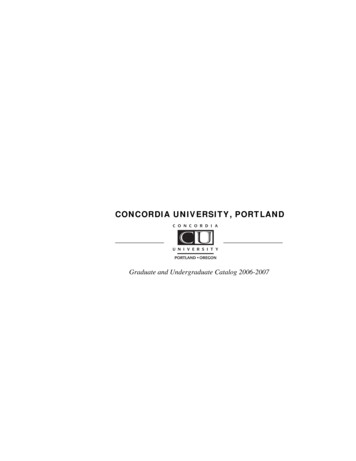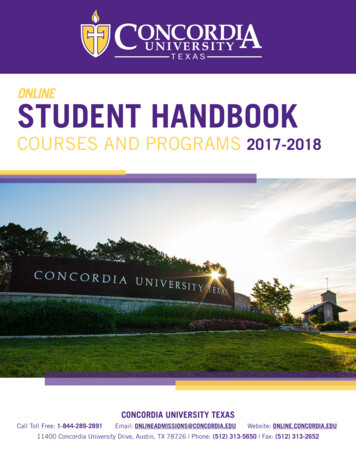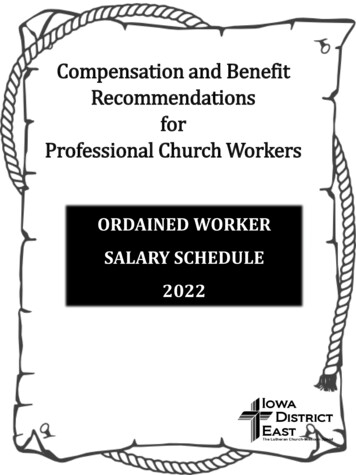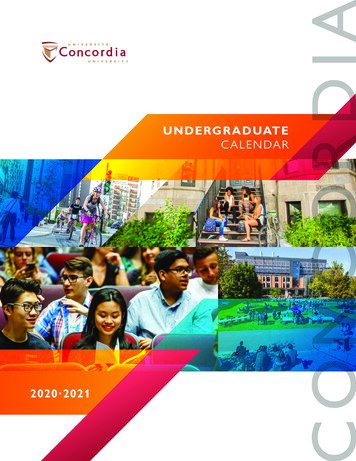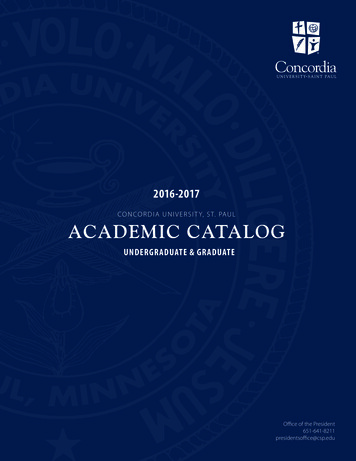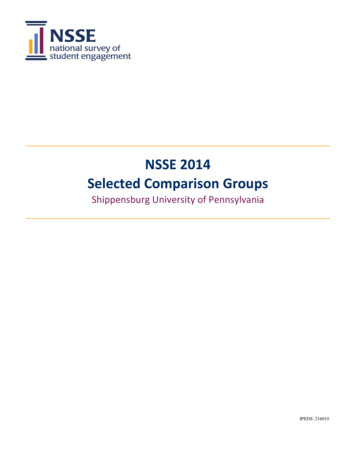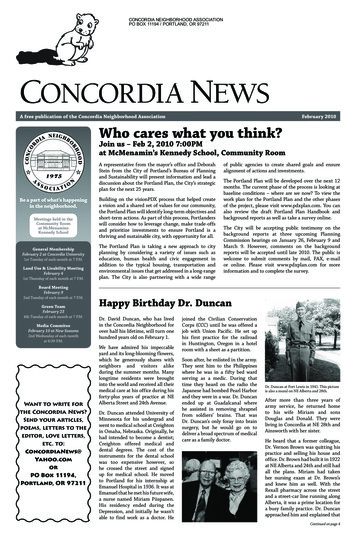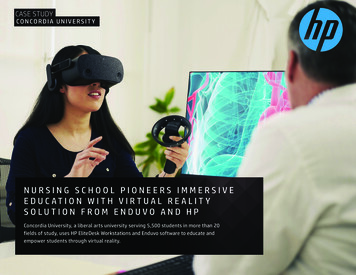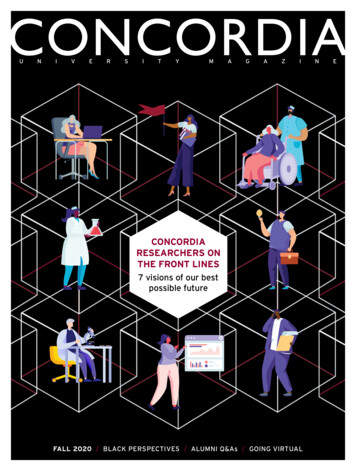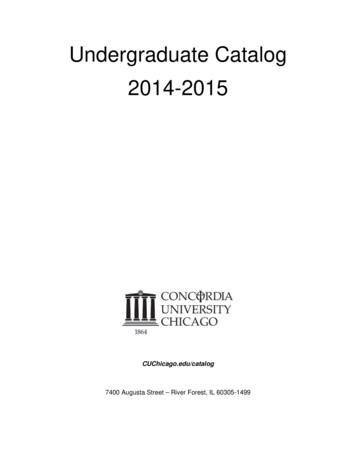
Transcription
Undergraduate Catalog2014-2015CUChicago.edu/catalog7400 Augusta Street – River Forest, IL 60305-1499
Table of ContentsUniversity Contact Information1Mission, Vision, Core Values2Academic Calendar3Programs and Accreditation4General Information10Undergraduate Admission13Honor Code20Undergraduate Fees21Financial Aid Information30Academic Information34Student Services48College of Arts & Sciences – General59College of Arts & Sciences – Pre-Professional Studies62College of Arts & Sciences – Bachelor of Arts Degree Requirements66College of Arts & Sciences – Bachelor of Science Degree Requirements69College of Arts & Sciences – Majors/Minors72College of Business – General112College of Business – Bachelor of Arts Degree Requirements115College of Business – Bachelor of Science Degree Requirements118College of Business – Majors & Minors121College of Education – General133College of Education – Church Worker Studies138College of Education – Early Childhood Program Requirements139College of Education – Elementary Education Program Requirements144College of Education – Secondary Education Program Requirements150
College of Education – Special Education Program Requirements158College of Education – Music Education Program Requirements164College of Education – K-12 Art Education Program Requirements169College of Education – K-12 Physical Education Program Requirements173College of Education – K-12 Spanish Program Requirements177College of Education – Director of Christian Education Program Requirements181Honors Program188College of Graduate and Innovative Programs (GIP) – General189GIP – Associate of Arts Degree190GIP – Accelerated Degree Programs193GIP – Certificate Programs198GIP – Correspondence Study201GIP – Community Outreach202GIP – Accelerated Degree Program Courses203Undergraduate Course Descriptions212Faculty – Current303Faculty – Emeriti316Administrative Personnel321Degrees Conferred324Legal Notices331
University Contact InformationAcademic o.edu/academics/academic-advisingAcademic Center for du/academics/successAccelerated Degree Completion u/cougarnetFinancial mission-financial-aid/undergraduatePublic dent Business Student uate ago.edu/admission1
Mission, Vision and Core ValuesMissionAs a distinctive, comprehensive university of The Lutheran Church–Missouri Synod, centered inthe Gospel of Jesus Christ, and based in the liberal arts, Concordia University Chicago equipsmen and women to serve and lead with integrity, creativity, competence and compassion in adiverse, interconnected and increasingly urbanized Church and world.VisionRooted in its Christian heritage of engaging knowledge and faith, Concordia University Chicagoaspires to be the destination university for all seeking to develop their full individual potentialthrough a distinctive, innovative and dynamic environment of exploration, creativity anddiscovery for leading lives of servant-minded leadership.Core ValuesWe at Concordia University Chicago embrace these Core Values as essential to living togetherin a vibrant and influential Christian academic community and as productive citizens of theChurch and world. Christian FaithThe Christian faith is an integral part of our community. The IndividualAs a member of God’s creation each person is unique and is blessed with inherentworth. ExcellenceWe strive for excellence in who we are and what we do. IntegrityOur community demonstrates the accord between our beliefs and practices. ServiceRecognizing and addressing the needs of others is a response to God’s love for us anda reflection of God’s love for them.2
Academic Calendar 2014-2015A more detailed calendar with add/drop, refund, and program-specific dates can be found onlineat CUChicago.edu. Click “Academic Calendars” under the Registrar area.Summer 2014Term BeginsMay 12, 2014Memorial DayMay 26, 2014No ClassesIndependence DayJuly 4, 2014No ClassesTraditional Term EndsAugust 1, 2014Graduation DateAugust 2, 2014No Ceremony for summer graduates; all summer graduates are invited to participate inthe Fall Commencement CeremonyFall Intent to Graduate DeadlineAugust 1, 2014Fall 2014 graduates must file their intent to graduate by this deadline.Fall 2014Term BeginsLabor DayCensus DateMid-Term BreakThanksgiving BreakAugust 25, 2014September 1, 2014September 19, 2014October 17, 2014November 27–28, 2014No ClassesNo ClassesNo ClassesSpring Intent to Graduate DeadlineDecember 1, 2014Spring 2015 graduates must file their intent to graduate by this deadline.Traditional Term EndsFall Commencement CeremonyDecember 12, 2014December 13, 2014Spring 2015Term BeginsMartin Luther King Jr. Obsv.Census DateSpring Break (UG only)January 12, 2015January 19, 2015February 6, 2015March 2-6, 2015No UG Day ClassesNo ClassesSummer Intent to Graduate DeadlineApril 1, 2015Summer 2015 graduates must file their intent to graduate by this deadline.Easter BreakEaster Monday Travel DayTraditional Term EndsSpring Commencement CeremonyApril 2-3, 2015April 6, 2015May 8, 2015May 9, 2015No ClassesNo UG Day Classes3
Programs and AccreditationAccreditation Higher Learning Commission of the North Central Association of Colleges and Schools(HLC-NCACS) Council for the Accreditation of Education Programs (CAEP, formerly NCATE) Council for the Accreditation of Counseling and Related Educational Programs (CACREP)o M.A. in Clinical Mental Health Counseling only National Association of Schools of Music (NASM)Academic Affiliates American Association of Colleges for Teacher Education Associated Colleges of the Chicago Area Association for Gerontology in Higher Education Council of Graduate Schools Council of Independent Colleges Education Advisory Board Federation of Independent Illinois Colleges and Universities Lilly Fellows Network National Association for Education of Young Children NetVue (Network for Vocation in Undergraduate Education) The Chicago Consortium of Colleges and UniversitiesDegrees Associate of Arts Bachelor of Arts Bachelor of Music Education Bachelor of Science Bachelor of Science in Nursing Master of Arts Master of Business Administration Master of Arts in Teaching Master of Church Music Doctor of Education Doctor of PhilosophyUndergraduate Colleges College of Arts and Sciences College of Business College of Education College of Graduate and Innovative ProgramsUndergraduate Programs – College of Arts and Sciences BA Arts BA Biology BA Chemistry BA Christian Ministry BA Communication BA Computer Information Systems BA Criminal Justice BA English4
BA Exercise ScienceBA Graphic ArtsBA HistoryBA Interdisciplinary StudiesBA JournalismBA MathematicsBA Media Arts AdministrationBA MusicBA Music with Business EmphasisBA Natural ScienceBA Natural Science: Pre Occupational TherapyBA Natural Science: Pre NursingBA PhilosophyBA Political ScienceBA PsychologyBA Social WorkBA SociologyBA SpanishBA TheatreBA Theatre AdministrationBA Theological LanguagesBA Theology – Christian StudiesBA Theology – Professional StudiesBA Visual Arts AdministrationBA Women’s & Gender StudiesBS Applied MicroscopyBS BiologyBS ChemistryBS Emergency Medical ServiceBS Environmental ScienceBS Health & Information Management - Joint degree with Resurrection UniversityBS Mathematics – Actuarial Science SpecializationBS Mathematics – Computer Science SpecializationBS Mathematics – Natural Science SpecializationBS Mathematics – Pure Math SpecializationBS Nursing – Joint Degree with Resurrection UniversityPre-Professional Programs Pre-Dentistry Pre-Law Pre-Medicine Pre-Pharmacy Pre-Veterinary MedicineUndergraduate Programs – College of Business BA Accounting BA Business Communications BA Management5
BA MarketingBS AccountingBS ManagementBS Management with Music EmphasisBS MarketingBS Media Arts AdministrationBS Not-For-Profit/Church ManagementBS Sports ManagementBS Theatre AdministrationBA AccountingBA Business CommunicationsBA ManagementBA MarketingBS AccountingBS ManagementBS Management with Music EmphasisBS MarketingBS Media Arts AdministrationBS Not-For-Profit/Church ManagementBS Sports ManagementBS Theatre AdministrationBS Visual ArtsUndergraduate Programs – College of Education BA Director of Christian Education (DCE) BA Director of Christian Education Certification with Elementary Education Licensure BA Visual Arts Education grades K-12 BME Music Education grades K-12 BS Early Childhood Education BS Elementary Education BS Physical Education grades K-12 BS Secondary Education – English/Language Arts BS Secondary Education – Mathematics BS Secondary Education – Physical Education BS Secondary Education – Science: Biology BS Secondary Education – Science: Chemistry BS Secondary Education – Social Science: History BS Secondary Education – Visual Arts BS Spanish Education grades K-12 BS Special Education ages 3-21Church Professional Programs Deaconess Director of Christian Education Director of Parish Music Lutheran Teacher Education Pre-Seminary6
Undergraduate Programs – College of Graduate & Innovative Programs BA Healthcare Management BA Organizational Management BA Sports & Recreation Management BS Management Information SystemsUndergraduate Credit-Based Certificate Programs Coaching Couple & Family Relationship System Gerontology Human Resource Management Information Technology Management Organizational Processes Piano PedagogyGraduate Programs MA Christian Education MA Clinical Mental Health Counseling MA Critical Perspectives in Education MA Curriculum and Instruction MA Curriculum and Instruction with ESL Endorsement MA Curriculum and Instruction with ESL Endorsement Bilingual Endorsements MA Differentiated Instruction MA Early Childhood Education MA Early Childhood Special Education MA Educational Administration MA Educational Technology MA Elementary Education MA ESL with optional TESOL Graduate Certificate MA Gerontology MA Grant Writing, Management and Evaluation MA Human Services MA Human Services/Administration MA Leadership Studies MA Music MA Online Teaching for PK-12 Educators MA Psychology MA Reading Education, Type 10 MA Religion MA School Counseling, Type 73 MA School Leadership, Principal Preparation MA Secondary Education – English/Language Arts MA Secondary Education – Mathematics MA Secondary Education – Physical Education MA Secondary Education – Science: Biology MA Secondary Education – Science: Chemistry MA Secondary Education – Social Science: History MA Secondary Education – Visual Arts MA Special Education, LBS 17
MA Sports LeadershipMA Teacher LeadershipMA TESOLMAT in Elementary Education, Type 03MAT in Secondary Education, Type 09MBA AccountingMBA Banking & Financial InstitutionsMBA Chief School of Business OfficialMBA ComprehensiveMBA Health Care ManagementMBA Leadership & Change ManagementMBA Not-For-Profit ManagementMBA School Business ManagementMBA Sports ManagementMCM Church MusicMEd Teaching and LearningMS Applied Exercise ScienceMS Instructional Design TechnologyEndorsements & Certificates Chief School Business Official (Endorsement Program) Church/Not-for-Profit Management (Graduate Certificate) Coaching (Certificate) Couple & Family Relational System (Certificate) ESL (IL Endorsement Program) ESL Bilingual (IL Endorsement Program) Gerontology (Certificate) Human Resource Management (Certificate) Information Technology Management (Certificate) Organizational Process (Certificate) Piano Pedagogy (Certificate) Special Education LBS1 (Endorsement Program) Spoken Word Pedagogy (Certificate) Technology Specialist (IL Endorsement Program) TESOL Graduate Certificate Type 03 Elementary Education (IL Endorsement Program) Type 09 Secondary Education (IL Endorsement Program) Type 10 Reading K12 (IL Endorsement Program) Type 73 School Service Personnel K12 (IL Endorsement Program) Superintendent Endorsement Type 75Doctoral Programs EdD/PhD in Leadership, specialization in Community Colleges EdD/PhD in Leadership, specialization in Curriculum and Instruction EdD/PhD in Leadership, specialization in Early Childhood Education EdD/PhD in Leadership, specialization in Educational Leadership EdD/PhD in Leadership, specialization in Higher Education EdD/PhD in Leadership, specialization in Organizational Leadership EdD/PhD in Leadership, specialization in Reading, Language and Literacy EdD/PhD in Leadership, specialization in Sports Leadership8
EdD/PhD in Leadership, specialization in Teacher Leadership9
General InformationConcordia University Chicago was founded in Addison, Illinois, in 1864. In 1913, the campuswas relocated to its current, beautiful 40-acre site in River Forest, Illinois.The College of EducationThe original mission of Concordia-Chicago was to prepare educators for Lutheran elementaryschools across the country. Today that strong tradition continues and has been expanded toinclude preparation for public school teachers. Accreditation by the Council for the Accreditationof Education Programs and approval of all education programs from the State of Illinois highlightand recognize the excellence of the undergraduate and graduate programs of education forthose who desire to teach at the preschool, elementary, middle or secondary level. ConcordiaChicago’s approved education programs provide Illinois state certification by entitlement. TheCollege also houses the Director of Christian Education Program, a course of study offered byConcordia since the mid-1960s.The College of BusinessOur College of Business provides students with an innovative and truly world-class learningexperience. Courses are taught by experienced business leaders and learned scholars, whoassist their students throughout a rigorous, but highly-supported degree track which allows themthe option of a general or specialized business degree. By utilizing the latest technology,stressing the importance of integrity and engaging students with real-world business scenarios,our faculty and staff have established an exciting, well-rounded learning environment thatprepares students for success in today’s business world.The College of Arts and SciencesConcordia-Chicago strives to provide a solid, broad-based education rooted in the liberal artsand sciences that can open the door to important understandings for students pursuingprofessional programs in accounting, computer science, communication, exercise science and ahost of other fields, as well as those desiring majors in pre-professional programs which willlead to further study in graduate or professional school. A total of 38 majors are included in theCollege of Arts and Sciences.College of Graduate and Innovative ProgramsOn and off campus opportunities exist for the benefit of professionals already in the work force.Correspondence study, workshops, conferences and seminars for students, teachers,administrators and musicians are offered. The Accelerated Degree Completion Program forAdults offers a Bachelor of Arts degree in organizational management. Concordia-Chicago’s60 Program invites adults over 60 years old to join us in our classrooms for their personalenjoyment and ours. A vibrant graduate program established in 1957 continues to expand andgrow. Professionals in music and social services are able to pursue advanced degrees at themaster’s level, while those in the education field are able to pursue both master’s and doctoraldegrees.The Campus CommunityLocated in the pleasant, tree-lined village of River Forest, Concordia-Chicago is just 10 milesfrom Chicago’s Loop. This proximity to a world-class city provides a variety of opportunities foradditional career, cultural, academic and social growth. Concordia-Chicago strives to provide acreative environment where horizons expand and where personal, social and spiritual growthcan become reality. The availability of both urban Chicago areas and the surrounding suburbsincreases students’ awareness and ability to respond as responsible citizens in our world.10
The mission of Concordia University Chicago is ultimately achieved in the lives of students. Witha student body representing more than 30 different states and seven foreign countries, CUCstudents come with an array of experiences and perspectives. In each college, quality facultyand staff work to challenge a student body of approximately 1,200 undergraduate students andmore than 3,700 graduate students. The low student-teacher ratio allows for smaller class sizes,creating a genuine, caring atmosphere where strong student-faculty relationships, facilitatinglearning and leadership development are built.Campus residence halls house approximately 600 students who come to our campus from largecities as well as small towns and farming communities across the world, while nearly half of ourstudents commute from their homes in the surrounding community.The Campus FacilitiesConcordia-Chicago’s 40-acre campus holds 21 buildings, architecturally blending old and newerfacilities.The Walter and Maxine Christopher Center for Learning and Leadership is a state-of-theart teaching facility that houses CUC’s Early Childhood Education Center, the College ofEducation and the College of Graduate and Innovative Programs. The first floor, designed toaccommodate the specific needs of young children, serves as a daycare andpreschool/kindergarten for the children of CUC students, faculty and staff as well as childrenfrom the community. More than a daycare or a school, this facility serves as a teachinglaboratory for future teachers learning their craft at Concordia-Chicago. The second and thirdfloors house faculty offices, conference rooms, testing rooms, methods classrooms, aneducational resource library and a state-of-the-art lecture hall.The Krentz Center, dedicated in the early 1990s, houses Bergmann Theatre, an intimate spaceused primarily for Children’s Theatre productions, a television studio, radio station, photographylaboratory, lecture hall and various classrooms.Koehneke Community Center is the location of the cafeteria, Cougar Den, bookstore, postoffice, meeting rooms, student recreation areas and student government offices.The Chapel of Our Lord/Clara and Spencer Werner Auditorium was designed as CUC’scenter for worship services and theatrical performances. This space continues to be occupiedby worship activities, theatre groups, rehearsal space and as a quiet location for meditation andprayer. Attached to the chapel is Kretzmann Hall, the home of the music, art and theologydepartments. This building also houses art, music and theology classrooms, the ElizabethFerguson Art Gallery, music practice rooms, rehearsal rooms and a music technologylaboratory.Other academic buildings include Eifrig Hall, used primarily for the natural and physicalsciences, and Addison Hall, which encompasses the administrative offices of the University aswell as classrooms upstairs.The Klinck Memorial Library is home to more than 160,000 books and audio/visual materials,140 print periodical subscriptions, 480,000 ERIC microfiche documents, and over 80 electronicdatabases with remote access. A special collection of musical scores, long-playing vinyl albums,and CDs is also available for use by library patrons. There are over 40 public computers andwireless Internet access is provided.11
Geiseman Gymnasium houses two gymnasiums, classrooms, athletic offices,the new state-of-the-art Fitness Center with cardiovascular and functional training equipment,two newly renovated weight rooms and a human performance laboratory. Outdoor athletic andrecreational areas include a new all-weather track and football/soccer field, tennis courts and afield house/concession stand adjacent to softball and baseball fields.On campus residence factilities include Brohhm, David-Jonathan, Gross, Kohn, Krauss,Lindemann and Mary-Martha Halls.12
Undergraduate AdmissionConcordia University Chicago is a Lutheran, Christian university with academic programs basedin the liberal arts. The University considers for admission candidates who demonstratereasonable ability to complete a program of study. Candidates must exhibit attitudes, values andcharacter that will contribute positively to the University’s mission and environment.All those applying for admission to Concordia University Chicago will be required to sign thehonor code pledge:“As a student of Concordia University Chicago, and a member of the larger society, I pledge touphold an academic honor code which supports serving and leading with strong personalintegrity. Specifically, this includes not cheating or using inappropriate or dishonest means in thecompletion of academic requirements. This also includes not giving unauthorized assistance toothers. I understand that it is my responsibility to comply with this honor system.”High school seniors are encouraged to apply during the first semester of their senioryear. However, students also may apply during the second semester. Freshmen are admittedonly for the fall and spring semesters.Transfer students should apply as early as possible, and may be admitted prior to thebeginning of any semester or summer session. Transfer students applying for the adultdegree completion program may apply at any time throughout the year and may be admittedprior to the beginning of the group cohort start. Additional information about admissionrequirements to the accelerated degree completion program is described in detail in the Collegeof Graduate and Innovative Programs section of the catalog.Concordia Chicago reviews applications on a rolling basis. An offer of admission that is made toan applicant before the completion of the final term carries with it the understanding that thecandidate will successfully complete that term of study. The University reserves the right towithdraw the offer of admission if the final report on the candidate is unsatisfactory.All entering students who wish to enroll in a mathematics course at Concordia UniversityChicago are required to take the mathematics placement exam before they will be permitted toenroll in a mathematics or physics course. Typically this includes all incoming freshmen withoutAdvanced Placement Calculus credit and transfer students who have not yet completed themathematics requirements for their program. The placement exam is offered during the JumpStart Orientation Program and during the Weeks of Welcome prior to the start of classes.Enrollment DepositAn enrollment deposit of 100, non-refundable after May 1st, is required of all new degreeseeking undergraduate students and is applied in full to the tuition upon completion of courseregistration.Admission requirements are outlined on the following pages; however, the UndergraduateAdmission Committee reserves the right to request additional information or documentation toevaluate applicants for admission (e.g. supplemental references, personal interview, additionaltesting, etc.Freshman ApplicantsTo be considered for admission as a new freshman, students must present the following: A completed application for admission13
An official high school transcript showing a high school grade point average of at least2.0 (4.0 scale) for 15 units (one unit one year) of credit in a college preparatorycurriculum at an accredited high school including: English, 4 units Mathematics, 3 units, including one unit algebra and one unit of geometry orequivalent (equaling 3 units) Science, 2 units, including at least one lab science course from biology, chemistry,physics or equivalent Social Science, 2 unitsAn ACT composite of at least 20 or SAT I (combined critical reading plus math) score ofat least 940. Concordia’s ACT code is 1004; the SAT code is 1140.A final, official high school transcript, complete with graduation date, must be submittedprior to enrollment in order to meet University, federal and state requirements.Final, official transcripts for any additional college work (if applicable) must be submittedprior to enrollment.First-time freshmen who have been out of high school for at least three years mustpresent the following: final official high school transcript with graduation date, or writtendocumentation of successful completion of the GED.Transfer ApplicantsTransfer applicants who have completed 15 or more semester hours must submit the followingto be considered for admission: A completed application for admission Official transcripts of all college coursework from every post-secondary institutionattended (this includes non-regionally accredited institutions), regardless of creditsearned. A minimum cumulative college grade point average of 2.0 (4.0 scale) for all prior collegecoursework and evidence of good academic standing at the last higher educationinstitution attended.Transfer applicants who have completed fewer than 15 semester hours (22.5 quarter hours) ofcollege coursework must submit the following to be considered for admission: A completed application for admission Official transcripts of all college coursework from every post-secondary institutionattended, regardless of credits earned Official ACT or SAT1 score Final high school transcript, complete with graduation date or written documentation ofsuccessful completion of the GED. An official high school transcript if the college from which credit was earned does nothave full regional accreditationTransfer students who leave a college under any circumstance other than with good standingmay be required to submit a written statement explaining their prior academic difficulty and whythey expect to be academically successful at Concordia University Chicago. In addition, CUCreserves the right to arrange an interview with a designated University staff member to discussthe above matters. Furthermore, the student may be asked to permit Concordia-Chicagopersonnel to talk with the Office of the Dean of Students at their former institution(s).Illinois Articulation Initiative14
Concordia University Chicago is a participant in the Illinois Articulation Initiative (IAI), astatewide agreement that allows transfer of the completed Illinois General Education CoreCurriculum between participating institutions. Completion of the transferable General EducationCore Curriculum at any participating college or university in Illinois assures transferring studentsthat lower-division general education requirements for an associates or bachelor’s degree havebeen satisfied, excluding graduation and mission-related requirements. This agreement is ineffect for students entering an associate or baccalaureate degree-granting institution as a firsttime freshman in summer 1998 and thereafter. You can learn more about IAI atwww.itransfer.org.The University reserves the right to determine the number and type of transfer credits acceptedtoward the student’s degree. The last two years of college work should be at the upper divisionlevel (general junior and senior level courses). No more than 67 semester hours (100 quarterhours) of lower-division transfer credit from a junior/community college and/or seniorcollege/university will be counted toward graduation, unless the student is participating in arecognized articulation agreement that allows for additional credit to be transferred.One-half of all the credit hours in each major must be completed in residence. At least 32semester hours of study at Concordia Chicago are required to meet residency requirements,preferably the last year before graduation. A CUC student’s cumulative grade point average iscalculated solely on courses taken at Concordia-Chicago. Transfer work is received as creditbut not factored into the student’s cumulative GPA.Home School ApplicantsRecognizing that not all students are educated in the same way, Concordia University Chicagowelcomes applicants who have been educated through home schooling. To be considered foradmission, home-schooled students must present the following: A completed application for admission An official transcript of all work completed A course syllabus and/or bibliography of materials studied for each course An official ACT composite score of at least 20 or an SAT I (combined critical readingplus math) score of at least 940 (Concordia Chicago’s ACT code is 1004; the SAT codeis 1140) A statement of purpose from the director regarding the home school A certificate of completion or diploma from the home school Official transcripts of any college coursework from every college/university attendedregardless of credits earnedHome-schooled students will be expected to have completed at least the same academiccourse pattern required of traditionally educated students: 4 units of English, 3 units ofmathematics including one unit each of algebra and geometry or equivalent (totaling 3 units), 2units of science, 2 units of social science and 4 additional college preparatory courses. Twoyears of the same foreign language are recommended. (Students choosing a liberal artsprogram who have not completed this requirement are required to take six semester hours oflanguage at the college level).Conditional Admission or Fresh StartConditional Admission: Students who do not meet the stated 2.0 GPA and 20 composite ACTor/940 combined mathematics and critical reading SAT test score require
Undergraduate Catalog . 2014-2015 . CUChicago.edu/catalog . 7400 Augusta Street - River Forest, IL 60305-1499
